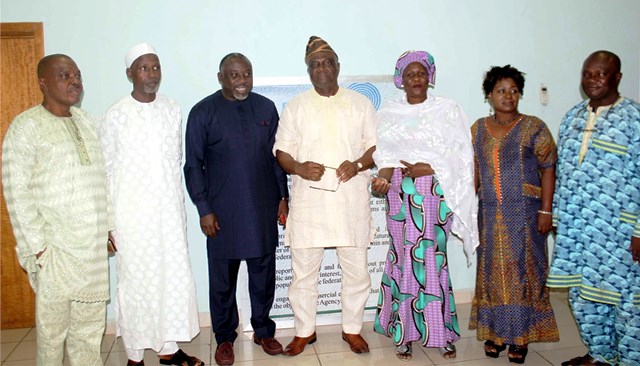Business
NCDMB Partners Dangote Refinery On Local Content

The Nigerian Content Development and Monitoring Board (NCDMB) has declared its intention to partner with Dangote Petroleum Refinery and Petrochemical Free Trade Zone Enterprises (DPRP) on the effective implementation of the Local Content Act in the country.
The Group Head, Media Communications, Dangote Group, Mr Anthony Chiejina, revealed this in Lagos on weekend.
Chiejina said that the Director, Monitoring & Evaluation of NCDMB, Mr Akintunde Adelana, who represented the board’s Executive Secretary, Simbi Wabote, confirmed DPRP readiness to implement the Act.
It was during the DPRP Nigerian Content Sensitization/Awareness Creation Programme, titled”Let’s Walk the Nigerian Content Talk Together,” at Lekki Free Trade Zone.
“The Dangote Refinery project is expected to close a major gap in the supply of petroleum products in the country. We consider this as a very important project and we are willing to partner with the company to ensure full implementation of the local content policy,” Adelana said.
“We embarked on this journey with the company a long time ago and we are ready to partner with the Dangote Group. Part of what you see to today is part of our efforts to ensure that the company and its contractors comply with the local content policy”, he added.
Adelana described the Local Content Act as the quantum of composite value added to, or created in the Nigerian economy by a systematic development of capacity and capabilities, through the deliberate utilization of human, material resources and services in the Nigerian oil and gas industry.
He said the country recorded losses prior to the enactment of the local content policy, which he noted, came from jobs executed abroad by International Oil Companies (IOCs), operating in the country.
“The narrative then was that nothing can be done in the country. Plants and modules were fully fabricated offshore without any structure in place to achieve knowledge transfer.
“ Before 2010, we had no active dry-dock facilities. The few we had were abandoned and left to rot away. Today, we have four active dry docking facilities in Port Harcourt, Onne, and Lagos,” he said.
He said the board’s mandate is to develop local capacity in key areas such as manufacturing and fabrication and promote indigenous ownership of assets and utilisation of indigenous assets in oil and gas operations.
Adelana added that the board’s responsibility also include linking the oil and gas industry with other sectors of the economy, enhance multiplier effect of oil and gas investments in economy and develop pool of competitive supply chain rooted in oil bearing communities.
Reading riot acts to defaulters of the Nigerian Content Policy, Adelana, on behalf of Wabote said non-compliance with the law, will result to the suspension of projects/contracts, penalty of five per cent of project sum, withdrawal of NCDMB’s services, and project cancellation unrecoverable sunk cost.
Business
Agency Gives Insight Into Its Inspection, Monitoring Operations

Business
BVN Enrolments Rise 6% To 67.8m In 2025 — NIBSS

The Nigeria Inter-Bank Settlement System (NIBSS) has said that Bank Verification Number (BVN) enrolments rose by 6.8 per cent year-on-year to 67.8 million as at December 2025, up from 63.5 million recorded in the corresponding period of 2024.
In a statement published on its website, NIBSS attributed the growth to stronger policy enforcement by the Central Bank of Nigeria (CBN) and the expansion of diaspora enrolment initiatives.
NIBSS noted that the expansion reinforces the BVN system’s central role in Nigeria’s financial inclusion drive and digital identity framework.
Another major driver, the statement said, was the rollout of the Non-Resident Bank Verification Number (NRBVN) initiative, which allows Nigerians in the diaspora to obtain a BVN remotely without physical presence in the country.
A five-year analysis by NIBSS showed consistent growth in BVN enrolments, rising from 51.9 million in 2021 to 56.0 million in 2022, 60.1 million in 2023, 63.5 million in 2024 and 67.8 million by December 2025. The steady increase reflects stronger compliance with biometric identity requirements and improved coverage of the national banking identity system.
However, NIBSS noted that BVN enrolments still lag the total number of active bank accounts, which exceeded 320 million as of March 2025.
The gap, it explained, is largely due to multiple bank accounts linked to single BVNs, as well as customers yet to complete enrolment, despite the progress recorded.
Business
AFAN Unveils Plans To Boost Food Production In 2026
-

 News3 days ago
News3 days agoNigeria Has Woken Up From Slumber Under Tinubu – Shettima
-

 News3 days ago
News3 days agoOji Clears Air On Appointment Of 15 Special Advisers By Fubara
-

 Featured3 days ago
Featured3 days agoRivers: Impeachment Moves Against Fubara, Deputy Hits Rock …As CJ Declines Setting Up Panel
-
News3 days ago
Nigeria To Begin Exporting Urea In 2028 -NMDPRA
-
City Crime3 days ago
Health Commissioner Extols Fubara’s Commitment To Community Healthcare Delivery
-
Niger Delta3 days ago
Tinubu, Leading Nigeria To Sustainable Future – Okowa … Lauds Oborevwori Over Uromi Junction Flyover Construction
-
News3 days ago
US – Nigeria Security Engagement Translating Into Tangible Operational Gains – NSA
-
News3 days ago
Situation Room Decries Senate’s Delay On Electoral Act, Demands Immediate Action

